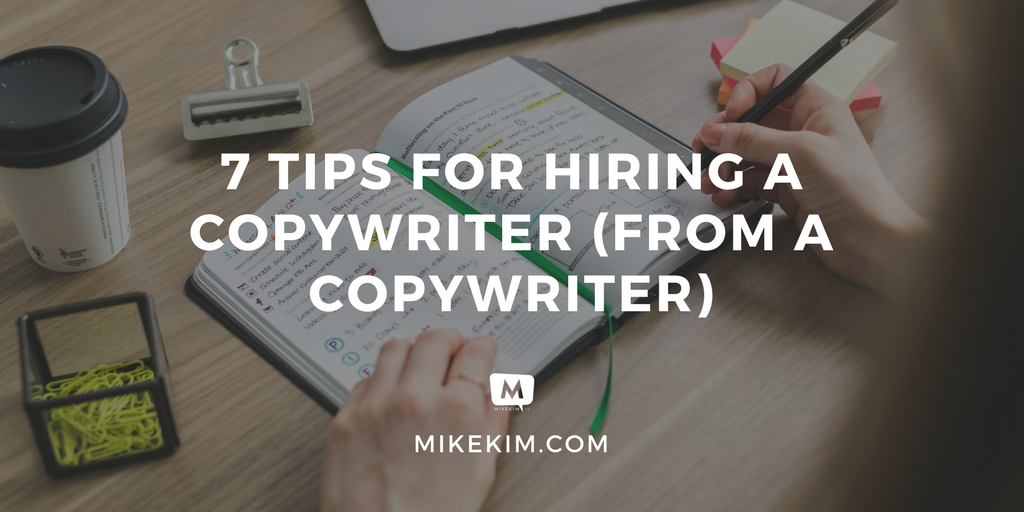 There are thousands of terrific copywriters in the world, and probably hundreds who would serve your brand well. So what’s the process in finding one?
There are thousands of terrific copywriters in the world, and probably hundreds who would serve your brand well. So what’s the process in finding one?
Here are 7 tips, all from experience:
- Decide Between Brand Awareness vs. Direct-Response
- Decide on the Deliverables
- Decide on the Skill Level You Need
- Set Clear Expectations on Deadlines, and Buffer Your Deadlines Further
- Ask for Samples
- Interview Them
- Find Personal Recommendations
#1: Know What Kind of Copy You Want
Do you want brand awareness copy, or direct-response copy? There’s a big difference between the two. Here are examples of each, both from Hpnotiq.
This first one is a brand awareness ad, or a “soft sell” that simply lets you know this company exists. Notice there’s no call-to-action. They don’t really tell the reader to do anything. It’s all about awareness.

This second ad is a direct-response ad. It has a call-to-action to instantly win $100,000 and visit hpnotiq.com.

There are terrific brand copywriters out there, but the money is in direct-response copy because that’s what drives sales. Understandably, direct-response copywriters charge higher fees.
If you’re looking for blog posts you’re probably better off with a brand awareness / soft-sell writer. If you’re launching a product or selling something directly off an ad or webpage, you need a direct-response copywriter.
TIP: Ask the copywriter if they are a direct-response writer. If they have no idea what you’re referring to, you have your answer.
(I’m shocked at how many copywriters I’ve met that do not know what direct-response is, but tell me they can write a launch. I do not hire them, and you probably shouldn’t either.)
#2: Decide on the Deliverables
Copywriters are like doctors. All of them have a general knowledge of writing, but most have specialties. Common deliverables include:
- Sales Pages
- Home Pages / Web Pages
- Email Marketing
- Content Marketing (blog posts, podcast shownotes)
- Online Advertising (Facebook ads, etc.)
- Print Advertising (brochures, direct mail, newspapers)
- White Papers
If you want someone that can do it all, that’s fine … but be prepared to pay up for it.
Over my career I’ve written copy for all the pieces listed, but I despise writing white papers, print advertising, and blog posts (for someone else). Email marketing is a close second, which is why I turn down most of these requests unless they’re part of an entire project, like a Jeff Walker-style product launch.
Why would you hire someone who neither specializes in or enjoys writing the kind of deliverables you need? You wouldn’t, so have that in mind when considering a writer. Know what deliverables you want.
#3: Decide on the Skill Level You Need
Not every project needs an A-list copywriter. Depending on the kind of business you have, you can probably get away with a serviceable writer for most of your week-to-week marketing. If you run a local dental practice, you won’t need a top-shelf writer from Ogilvy & Mather.
But if you’re launching an online product in the vein of Jeff Walker’s Product Launch Formula, a strong direct-response writer is a must because nearly every piece of collateral in that campaign will be to create a transaction: register for a webinar, click a Facebook ad, open an email, and of course, purchase the product.
I’ve charged a minimum of $25,000 for projects like this.
If you find a strong writer, keep them. Many copywriters have no interest in taking new clients because their current contracts suit them just fine, or they are on a retainer. With these folks, you not only have hire them to work with you, you have to hire them AWAY from their current clients.
Finding a strong writer for your brand is like a long-term relationship … the more that person gets to know you, the more the work matures. At that point, the opportunity cost for both the brand and the copywriter becomes too high to work with someone new and start all over again.
Your writer will grow in skill level with the experience they gain from working on your brand, even if they aren’t “A-level.” If you have regular copy needs, consider hiring someone on retainer or even full-time. It’s an investment, but if words are important to your business, it will be worth it.
#4: Set Clear Expectations on Deadlines and Buffer Your Deadlines Further
Due dates drive actions. Set clear expectations on when you need the deliverables. Actually, go a step further and make sure you set due dates for the entire campaign you have that writer working on. After all, that writer is simply one cog in your overall marketing machine.
But, this next step is really important.
You should always set at least an additional 2-day buffer on your end from the due date you give your writer or any other creative professional. Why? Because delays happen … and this isn’t always the copywriter’s fault.
I’ve worked on numerous projects and been asked to submit copy by a Monday. In turn, I would ask the client for approval or revision requests two days later, by Wednesday. Dutifully, I would block off Thursday to work on said revisions … only to find the client was “swamped” and wouldn’t have the revisions to me in time. Sometimes, those turnarounds took weeks.
Life happens, so give yourself an extra two days from the deadlines you set.
(Nowadays, when I submit copy by Monday, I ask the client to submit the revisions by Wednesday but I don’t expect them at least until Friday. So I block off the following Monday to work on it, and tell the client that once they submit the revisions, it will be a week later that they’ll hear from me even though I often return the final draft earlier.)
#5. Ask for Samples
If a writer doesn’t have a page where you can sample his or her writing, that’s their fault. You should ask for samples.
I’ve had some influential clients in my career, and 100% of the 7-figure+ businesses that hired me said they read a vast number of my blog posts before reaching out to me. Content is (still) king.
I haven’t had to “chase” a client in years; the leads come to me because of my content and referrals. When a prospect finds this site, they see a well-constructed brand, a huge body of work, and some client testimonials. They rarely ask for samples because my platform is the sample.
If you’re a copywriter and wondering what you need for a bare minimum website, I recommend:
- A strong homepage that positions you as a copywriter along with your speciality, and a call-to-action to hire you
- A friendly yet informative about page, and a call-to-action to hire you
- A simple copywriting portfolio page. Though terribly outdated, you can view my copywriting portfolio page here. It’s insanely simple to create and quite inexcusable if you don’t have one. I’ve sent that link to prospects who have hired me for $25,000+ contracts. If you don’t make it easy for people to hire you, people won’t hire you.
#6. Interview Them
At some point you will have to talk to the copywriter. Don’t correspond solely through email. The human touch is important.
Now, if this person does not have a website where you can get many of the following questions answered … hire someone else who does. As the client, you should not have to pay for the copywriter’s laziness and lack of preparation.
If you still really want to hire this person, ask these questions. You deserve to know who you’re about to do business with. Sure, it would have been nice if they did the proper job of providing these answers on a simple web page but again, you should not have to pay for the freelancer’s laziness and lack of preparation. Ask away.
- How did you get into copywriting?
- What kind of copy do you specialize in?
- Is there a product category you prefer to write for?
- Do you have samples?
- Who have you worked with, and in what capacity?
- Do you have any professional certifications, or degrees in English, journalism, or marketing? (I ask this more to ensure the person isn’t grammatically illiterate, or spells worse than a 1st grader.)
- Have you ever come up with copy (headline, story, blog post) that you thought was amazing, but your client didn’t? What did you do?
Copywriters, it may behoove you to literally copy and paste the questions above, answer them, and literally post that copy on your about page and LinkedIn profile. This is not hard to do. I dare say this could improve both the frequency of requests and the quality of prospects you attract.
#7. Find Personal Recommendations
This is an age-old business practice, so ask your friends and colleagues for recommendations. These days, most of my big copy requests come from referrals. Years ago, I was contacted by Donald Miller of StoryBrand for a copy project. He had never heard of me, but said he was referred to me by Michael Hyatt‘s CMO and my friend Ray Edwards.
You copywriters may then say, “See Mike? If that’s what works for you, why should I setup a site and answer all those questions from point #6 above?”
Because when I spoke to Don, he said “I spent the last few hours reading through your website and really felt like I got to know you. Then I filled out your form.”
Copywriters, stop selling, start serving. Providing content on a site is a way of serving your prospects. It makes it easy for them to get to know you on their own time, and establishes your expertise. Don’t be lazy. Stop shooting yourself in the foot. If you make it easy for people to hire you, and you’ll win more contracts.
Doing this simple exercise will immediately set you apart from most of your peers and allow you a greater opportunity to speak the language of your ideal customer.
